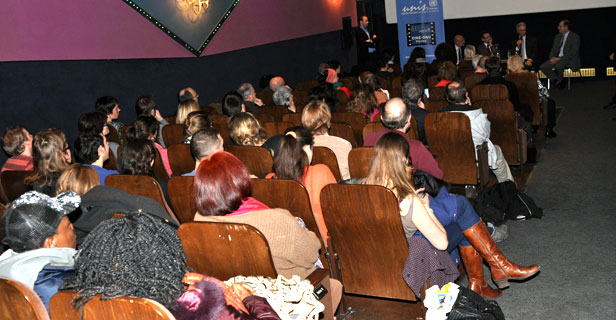
On the occasion of the International Day of Commemoration in Memory of the Victims of the Holocaust (27 January), the United Nations Information Service (UNIS) Vienna, in cooperation with the Permanent Mission of Israel to the United Nations in Vienna, Topkino, this human world (THW) Film Festival and the United Nations and the Holocaust Outreach Programme screened the documentary "The Rescuers" by Emmy Award-winning filmmaker Michael King.
The film tells the stories of 12 courageous diplomats, who, at tremendous personal cost, saved tens of thousands of Jews during the second World War. To pay tribute to the everlasting importance of their deeds and to show their heroism, three diplomats were invited to join this evening event and participated in the panel discussion following the screening. The invited officials were: Ambassador Aviv Shir-On, Permanent Representative of Israel to the United Nations Vienna, Ambassador Thomas Greminger, Permanent Representative of Switzerland to the UN Vienna and David Bame, Acting Deputy of the Permanent Representative of the United States of America to the UN Vienna.
In his opening speech UNIS Vienna Director Janos Tisovszky drew the audience's attention to the fact that the choice of these particular stories by the filmmakers was to offer a message of inspiration to today's ambassadors. Since, at crucial moments, when the need for strong personal decisions is of great importance, those responsible for them have to act in accordance with their own unwritten instructions, and may be breaking the rules.
The film's narrative is built around the research of a young Rwandan anti-genocide activist Stephanie Nyombayire, who lost almost all the members of her family in the Rwandan Genocide of 1994. Sir Martin Gilbert, the renowned historian, specializing on Holocaust, accompanies her, as they travel across 15 countries and three continents interviewing survivors and descendants of the diplomats.
These deep and touching stories led the panel discussion to consider how such daring acts by diplomats could happen in the world of entrenched bureaucracy. The panel guests unanimously agreed that they could not argue with the heroism and courage these diplomats had shown.
In response to a question about what a modern diplomat can do to prevent acts of violence, Mr. Bame emphasized the following: "Private negotiations can surely be called to reinforce public diplomacy". According to him it is mainly through first-hand communication that it is possible to achieve justice on an everyday basis.
Ambassador Greminger stressed the importance of prevention to ensure that such tragedies as the Holocaust never take place in the future.
Ambassador Shir-On appealed to the public with the message "Tikkun olam" which in Hebrew means "to heal the world". According to his belief, we now have many possibilities to help those in need. However, sometimes the drastic measures to change things can call for overcoming the standard barriers -which is what the righteous diplomats did.
The participants of the discussion agreed about the primacy of the role of human virtues in directing the diplomats' deeds in the face of great danger. Acknowledging and remembering these brave people who acted out of their moral convictions is an important task of the international community and particularly the United Nations.